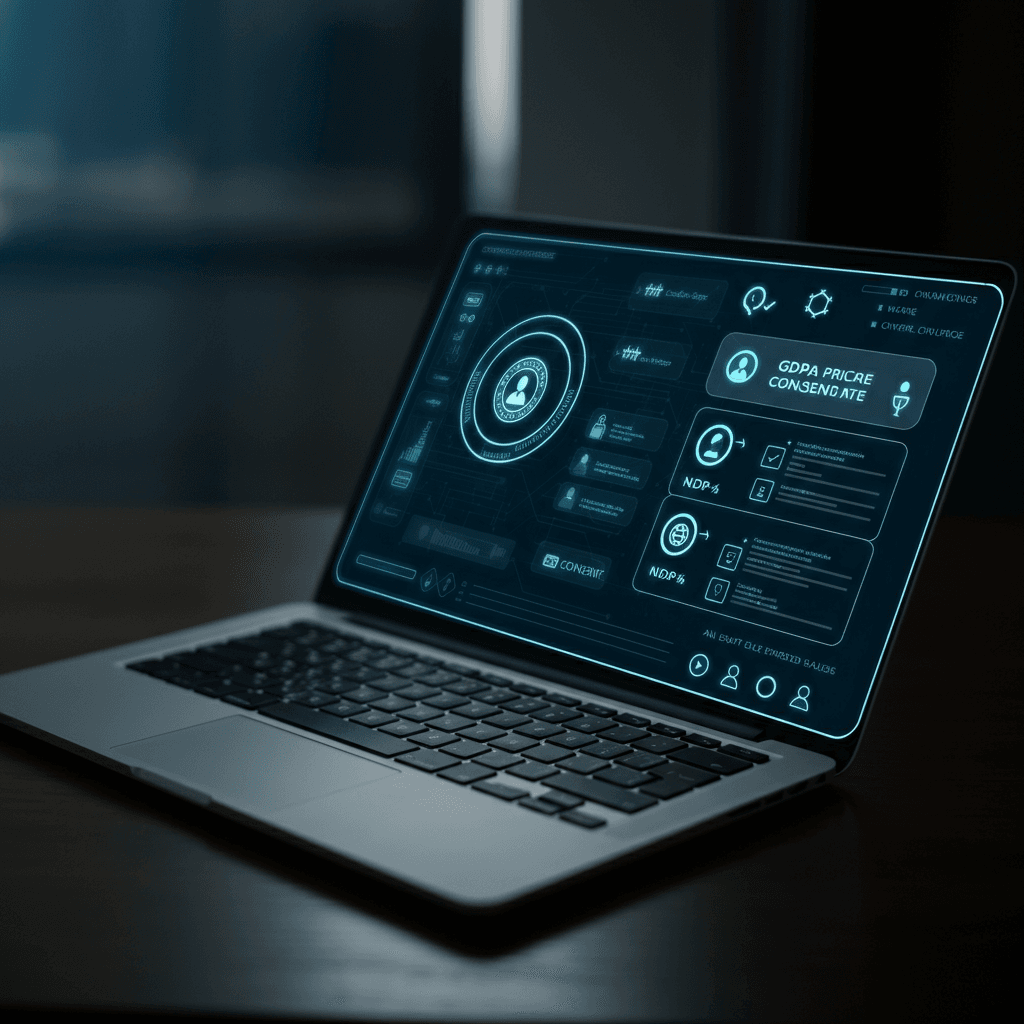With the explosive growth of artificial intelligence (AI) technologies, questions about data privacy have taken center stage. AI systems, powered by massive datasets and advanced algorithms, depend heavily on user data to operate effectively. This reliance, however, has triggered concerns about how personal information is collected, stored, and used. The use of AI technology brings associated privacy challenges and ethical concerns, highlighting the need for transparent design and ethical use to respect personal data rights. From increasing surveillance fears to unauthorized data usage, the intersection of AI and privacy has sparked widespread controversy. A recent survey revealed that 57% of consumers globally agree that AI poses a significant threat to their privacy.
This article examines the most pressing concerns about AI and privacy, explores high-profile controversies, and discusses solutions being proposed to mitigate these issues. Finally, we’ll investigate how society can strike a balance between technological innovation and individual privacy in the digital age.
Introduction to AI and Privacy
Artificial intelligence (AI) has become an integral part of our daily lives, transforming the way we interact with technology and each other. From virtual assistants to personalized recommendations, AI technologies are embedded in numerous aspects of modern life. However, as these technologies continue to advance, concerns about privacy have grown. Many individuals and organizations are questioning the impact of AI on personal data and sensitive information.
The intersection of AI and privacy is complex. AI systems rely on vast amounts of data to function effectively, but this dependence poses significant privacy risks. Understanding the relationship between AI and privacy is crucial for developing and implementing AI technologies that respect individual rights and freedoms. This section will explore the key concepts and challenges related to AI and privacy, including data collection, AI systems, and data protection.
The Data Dependency of AI
Artificial intelligence thrives on data. Algorithms need vast amounts of input to learn patterns, improve predictions, and develop intelligent outputs. Data processing plays a critical role in AI, as it is essential for modeling digital identities and analyzing extensive datasets to uncover complex patterns. But this requirement, while crucial for progress, has led to practices that often encroach on user privacy.
Types of Data AI Systems Use
AI models utilize a range of data types to train and optimize their functionalities. These include:
Personal Identifiable Information (PII): Names, addresses, emails, and biometric data.
Behavioral Data: Browsing history, app usage, and online purchase patterns.
Sensitive Data: Financial details, medical records, and location data.
AI’s capacity to process and analyze these datasets has unlocked revolutionary innovations. But it has also raised alarms about how companies access and use this data.
The Key Privacy Concerns with Sensitive Data

Data Collection Without Consent
AI often relies on datasets aggregated without explicit user consent. Many find themselves unknowingly “feeding” these algorithms through online behavior or by agreeing to terms and conditions they barely read.Data Storage Risks
The central storage of data introduces vulnerabilities. With cyberattacks on the rise, stored personal information in AI databases becomes a prime target for hackers.Unethical Usage
Even when acquired legally, data is sometimes used for unintended purposes, like targeted marketing, political profiling, or more malicious objectives such as deepfake creation.
AI Technologies and Data Protection
AI technologies, such as machine learning and natural language processing, rely on vast amounts of data to function effectively. This data can include sensitive information, such as personal data, location data, and financial information, which must be protected from unauthorized access and misuse. The reliance on such data introduces significant privacy concerns, as any breach or misuse can have severe consequences.
AI systems can pose significant risks to data protection, including data breaches, identity theft, and unauthorized data sharing. To mitigate these risks, organizations must implement robust data protection measures. These measures include encryption, access controls, and regular security audits to ensure data security. Additionally, AI systems must be designed with data protection in mind, incorporating principles such as privacy by design and data minimization. By prioritizing these principles, organizations can protect user data while still leveraging the power of AI technologies.
High-Profile Privacy Controversies
Numerous controversies involving AI and data privacy have forced the issue into the public eye.
1. The Cambridge Analytica Scandal
Perhaps one of the most infamous cases in recent history, Cambridge Analytica used data harvested from Facebook profiles to influence political campaigns, particularly during the 2016 U.S. Presidential Election. The scandal revealed how AI algorithms could manipulate voting behavior based on detailed user profiling, sparking a global debate on transparency and consent.
2. Clearview AI’s Facial Recognition Software
Clearview AI found itself under fire for scraping billions of online images without user consent to develop its facial recognition technology. Critics argued that this was a gross violation of privacy, as individuals whose faces were in the database never agreed to be included. Governments and regulators around the world demanded accountability.
3. OpenAI’s ChatGPT Data Leaks
OpenAI faced scrutiny after reports surfaced of conversations with its conversational AI model, ChatGPT, being leaked or stored without user knowledge. Though anonymized, the conversations occasionally included sensitive information, reigniting concerns about how companies secure user interactions with AI systems.
Societal Backlash to AI-Driven Data Exploitation
The public response to these events underscores a growing mistrust in how tech companies handle user data. Surveys show that more than 80% of individuals express concern about AI infringing on their privacy, while only a fraction believe corporations can be trusted to use data ethically. Additionally, 81% of consumers think the information collected by AI companies will be used in ways people are uncomfortable with.
Beyond these concerns, critics argue that AI amplifies existing surveillance capabilities, giving rise to “big brother” fears. For example, nations deploying AI-powered surveillance systems raise ethical questions about their potential misuse to suppress dissidents or monitor populations excessively.
Solutions to Mitigating AI Data Privacy Issues
Though the concerns are significant, several strategies and technologies are emerging as potential solutions to balance AI’s capabilities with user privacy.
1. Encryption Protocols
Improved encryption ensures that data remains secure both at rest and during transmission. Advanced encryption standards make it difficult for hackers to access user data, even during breaches.
Example: End-to-end encryption, as used in platforms like WhatsApp, ensures that only the intended participants of a conversation can access its contents.
2. Federated Learning
Federated learning involves training AI models directly on devices rather than centralized servers. This way, data stays on users’ devices, and only insights, not raw data, are shared with AI developers.
Real-Life Usage: Google uses federated learning for improving predictive text features in its Gboard keyboard app without directly accessing user typing data.
3. Differential Privacy
Differential privacy adds random noise to datasets, obscuring personal details while still allowing AI to extract meaningful insights. This method ensures that individual user information within a dataset cannot be linked back to its source.
Key Benefit: It enables both innovation and confidentiality, offering an ideal compromise for privacy-focused businesses.
4. Transparency and User Control
Providing users with clear, accessible privacy settings allows them to control how their data is used.
Examples of Good Practice: Apple’s App Tracking Transparency feature forces app developers to request user consent explicitly before tracking data. Similarly, Microsoft allows users to review and delete the data collected through its services.
5. Stronger Regulations
Regulatory frameworks are playing an increasingly critical role in safeguarding privacy.
The European Union’s GDPR: The General Data Protection Regulation (GDPR) has set a global benchmark by enforcing strict rules on data usage, requiring businesses to be transparent about how they collect and process data. Noncompliance involves hefty penalties.
California Consumer Privacy Act (CCPA): This law gives residents of California the right to know what data companies collect and the ability to request deletion.
Globally, other regions are developing AI oversight committees to monitor algorithmic biases and unethical data use.
6. Ethical AI Design
Embedding privacy principles during the development of AI models through Privacy by Design (PbD) ensures responsible and ethical data usage.
Principle in Action: Privacy-conscious companies develop AI systems designed to require minimal user data, choosing to prioritize innovation using anonymized and aggregated datasets.
AI Regulation and Governance

The regulation and governance of AI technologies are critical for ensuring that AI systems are developed and deployed in a way that respects individual rights and freedoms. Governments and regulatory bodies must establish clear guidelines and standards for AI development and deployment, including data protection and privacy regulations. These regulations are essential for addressing significant privacy concerns and ensuring that AI tools are used responsibly. The EU’s AI Act represents a political agreement to regulate AI technologies in Europe, setting a precedent for global AI governance.
Organizations must also establish internal governance structures and policies for AI development and deployment. This includes implementing data protection and privacy policies that align with regulatory standards. The use of AI in decision-making processes must be transparent and accountable, with clear explanations of how AI systems arrive at decisions. Regular audits and assessments are necessary to ensure that AI systems are functioning as intended and that data protection and privacy regulations are being met. By adhering to these guidelines, organizations can protect personal information and build trust with users.
The Future of AI and Privacy
Striking a Balance
Balancing privacy with AI innovation will remain a challenge as technology advances. Developers will need to walk the line between optimizing AI performance and respecting users’ right to privacy.
Public Awareness and Education
Educating the public about data privacy can empower individuals to make informed decisions about the digital services they use. Efforts to teach basic cyber hygiene and data management could significantly reduce misuse. According to a 2019 Ipsos survey, 80% of respondents across 24 countries expressed concern about their online privacy, highlighting the importance of such educational initiatives.
Collaborative Standards
Cross-industry collaboration is essential. Governments, tech companies, and advocacy groups need to work together to set universal standards for ethical AI usage and privacy protection.
Designing a Privacy-First Internet
Initiatives like decentralized web platforms, powered by blockchain, are slowly gaining traction as an alternative to centrally controlled ecosystems. By shifting ownership and control of data to users, they offer a potential roadmap for preserving privacy in the AI-driven age.
Final Thoughts
AI is undeniably a revolutionary force, transforming industries and daily life at remarkable speed. But with great power comes great responsibility. It is crucial to address the implications of data collection and usage now to ensure that individuals retain control over their information. A 2021 study found that 52% of U.S. adults are more concerned about AI becoming embedded into their daily lives rather than excited about it.
Advancements in privacy-enhancing technologies, regulatory frameworks, and transparent practices offer promising solutions to mitigate AI’s privacy challenges. Ultimately, how technology evolves will determine whether AI becomes a trusted partner or a tool that undermines fundamental rights.
By striking a balance between innovation and privacy protection, society can shape an AI-driven future where both efficiency and ethics coexist harmoniously.
